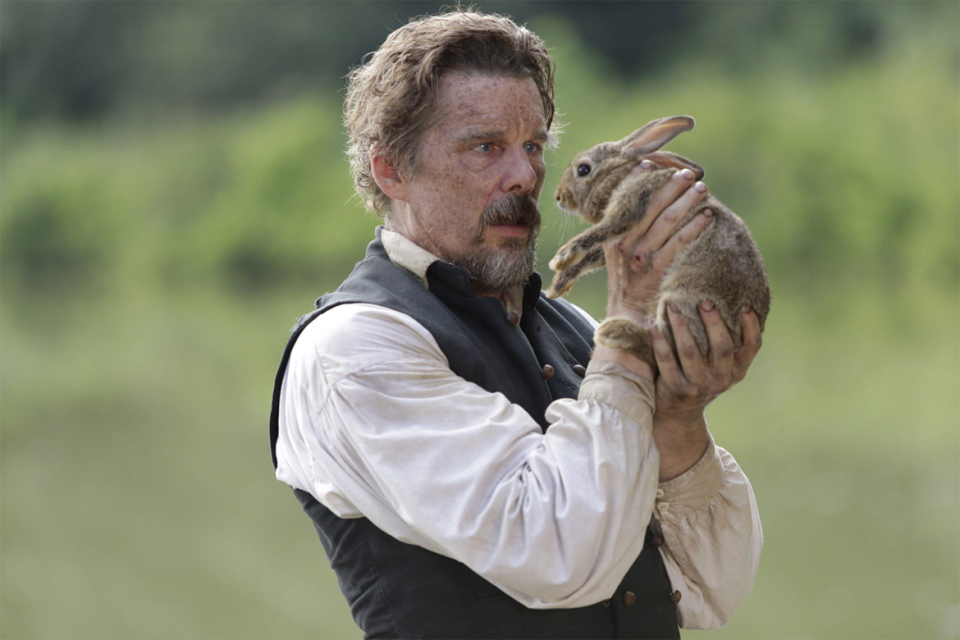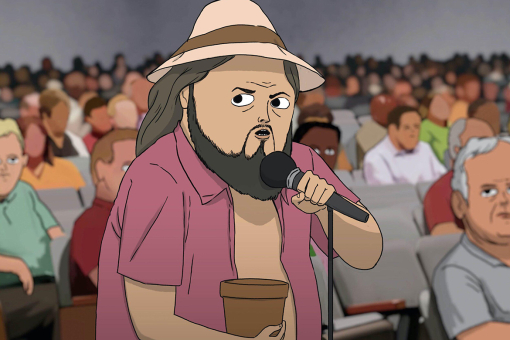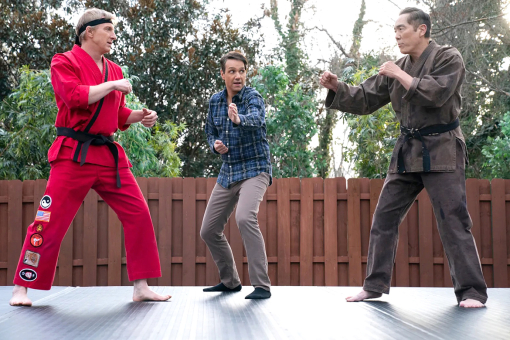I always associate you going far back with Richard Linklater, but I think you've known Jason even longer.
It's funny you mention Rick, because I think Jason was with me the day I left New York to go to Vienna to start Before Sunrise [in 1994]. Yes, I have known Jason for an extremely long time. He was the artistic director of Malaparte, the theater company I started when I was 21. We ran around New York and had a lot of laughs.
All young people who love the arts, generally, imagine themselves as rock stars, movie stars, film directors, you know. Jason was the only young guy I knew who was like, "I want to be a producer. I want to make shit happen." He was passionate about building spaces for people to do great work. He saw a lane for himself there. And we closed the doors of our theater company having made money — that's how fiscally responsible he is. He has a knack for it.
Is it true that he used to hawk flyers in Times Square?
We did it together. He speaks French, and there are a lot of tourists who used to wind up there. Jason had this brilliant idea that we go hand out flyers where people buy their seats for Broadway, because our seats only cost $10. Some of the people would recognize me from Dead Poets Society, so we would go there to hand out flyers, and all these people would come. It sounds kind of crazy now, but we had a lot of fun doing it.
If I'm counting correctly, you've done nine projects with him.
Well, I haven't kept score, but that sounds about right, yeah.
You're the one who approached him about The Good Lord Bird, right?
Yes. When I approached him about The Good Lord Bird, it was to make it as a film. It was his idea to say, "Hey, let's not limit this — this is a great limited series. If you make it as a movie, you're gonna have to cut it into two-and-a-half hours. If we do it as a limited series, we can do it however long it needs to be told." That was a very exciting idea to me.
I was gearing up to pitch The Good Lord Bird. I was very excited about it. I had a great meeting with James McBride [author of the novel The Good Lord Bird], and I was really high on the idea of this movie. We were in South by Southwest for the premiere of In the Valley of Elah, a Western we made. On the way, I started telling him about the book.
While I was telling him, the driver, an intern at Blumhouse, freaked out about what a great book it is: "It's best book I've ever read in my life!" The guy saved my pitch. Jason was like, "What the fuck is this guy freaking out about?" So, I think he read the book a lot faster than he would have had I just asked him to.
Of all the projects you and he have collaborated on, is The Good Lord Bird the most meaningful to both of you?
Oh, definitely. I mean, it was the biggest risk to make a movie about John Brown right now, in the climate of the world and what's going on. It's a very dangerous book experience. It's very incendiary. It's very difficult. The canvas is really big, and there were a lot of ways it could have gone wrong.
There's this blessing that comes along with working with friends. You care about each other, and you want to come through for each other, but there's also a lot of pressure. Because when things go wrong, it's not just the work that's going wrong. It's a very meaningful relationship, and there was a lot of money changing hands.
Whenever you engage in serious talk about race in this country, it's dangerous. There are a lot of different points of view. And the climate that we were making it in, it was all very hot to the touch.
I'm really proud of it. McBride has been a hero to Jason and I, and he was a great friend. There are two things Jason and I did together that were really, really hard. One was being 21 and trying to start a theater company. I haven't worked that hard my life. And the second is Good Lord Bird. Those two things are almost 30 years apart. Both of them are really meaningful to us, I think, for different reasons.
But The Good Lord Bird is one of the most meaningful — if not the most meaningful thing — I've ever worked on. It was not easy to get made, it was not easy to make, it was not easy to get released. Every now and then, an opportunity presents itself to take everything you've learned about this business to try to do what you really want to do with your life. And this was one of those for us.
It's fascinating that Jason worked for the Weinstein brothers at Miramax in its distribution department before establishing his foothold in development. Was he really as miserable there as he says he was?
Oh, God, he was miserable. That whole building was miserable, to be honest. It's like all his passion got punched in the face. You watched him, like, withstand blow after blow, and joy is such a big part of him. And I think that's why it didn't take very long for him to be in the position that he's in now and where I'd imagined he'd be. Some people get more miserable when they're successful, and Jason just gets more and more wonderful.
Jason can't just be successful because of his business plan. From a friend point of view, what do you think is the reason?
Certainly not the business plan. I would go a little bit deeper and say he has an honest, for lack of a better word, joy to him. And he's very playful with his mind and how his business works, and I've always thought of it as, he enjoys coloring outside the lines. He enjoys finding a way to do something in a different way. And he's not extremely superficial. He's not doing it to collect prizes or something like that. It's not the way his brain works.
His greatest thrill is cracking the system and getting something made when it's not supposed to get made. He was the the same way with the theater company. The reason we made money in the theater company was not just good investments. It was because of his crazy, weird ideas like going to Times Square to hawk flyers. He thinks outside the box. I used to call him Tom Sawyer because he has a way to trick people into painting his fence.
I'll give you an example. When we were doing the theater company, we just wanted to talk to girls. We cared about movies and stuff, too, but that was definitely ancillary. We had this problem. We wanted to do three plays in three months, and we didn't want the theater to be dark within the time period between taking down one stage and building another set. There were days that the theater was going to be dark, and each day hurt because we were paying a lot of money in rent, and we didn't have any income.
So, Jason's big plan was that we would have a closing-night party for the first play. We would get a band, and we would get a keg, and we would have a party. We would invite everyone, and we would strike the set and load the new set during the party. We had 250 free laborers. So, it was kind of a party, and kind of a work thing. He tricked us. It was one of the most fun nights we ever had.
You're obviously supportive, and you've got all these stories, but does his level of success surprise even you?
What really surprised me is how long it took to happen, that's all. When he was running the theater, I was like, "Geez, how long can I keep this guy? This guy's unbelievable." It doesn't surprise me at all. His father is an extremely successful art dealer, and that relationship and that family created a tremendous drive. That drive is debatably wonderful or debatably compulsive, but whatever it is, it's working for him.
My friendship with Jason has been one of the great lessons of my life. We've had a lot of wild experiences. My secret hope is that someday I'll talk him into an end game of running a theater company in the Bronx.
This interview has been edited and condensed.
For more on Blumhouse, click HERE











